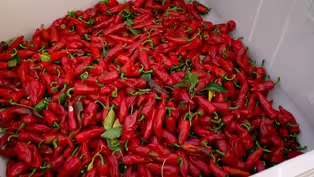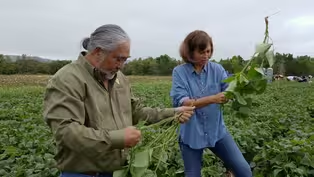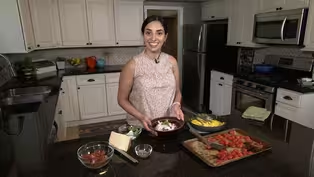
Coastal Alabama Peanuts
Clip: 6/30/2023 | 4m 46sVideo has Closed Captions
A new peanut plant in Alabama is owned by hundreds of local growers.
A new peanut plant in Alabama is owned by hundreds of local growers of this popular legume.
Problems playing video? | Closed Captioning Feedback
Problems playing video? | Closed Captioning Feedback
America's Heartland is presented by your local public television station.
Funding for America’s Heartland is provided by US Soy, Sustainable Agriculture Research and Education, Rural Development Partners, and a Specialty Crop Grant from the California Department of Food and Agriculture.

Coastal Alabama Peanuts
Clip: 6/30/2023 | 4m 46sVideo has Closed Captions
A new peanut plant in Alabama is owned by hundreds of local growers of this popular legume.
Problems playing video? | Closed Captioning Feedback
How to Watch America's Heartland
America's Heartland is available to stream on pbs.org and the free PBS App, available on iPhone, Apple TV, Android TV, Android smartphones, Amazon Fire TV, Amazon Fire Tablet, Roku, Samsung Smart TV, and Vizio.
Providing Support for PBS.org
Learn Moreabout PBS online sponsorship♪♪ [Dirk Lindsey] Peanuts are becoming more and more important to this... to this area.
20 years ago, there wasn't many peanuts planted in southwest Alabama, and now, uh, they're probably the number two grow crops that are planted.
Peanuts is a... is a very good source of plant-based protein that's affordable, that kids like to eat.
Not only do kids like peanuts, so does just about everyone else.
Peanut consumption is at an all time high, averaging more than seven pounds of peanuts per person in 2020.
Here in the small town of Atmore, Alabama, farmers are ready to take advantage of peanuts growing popularity.
A new peanut plant opened in 2021 that can process about 600 tons of peanuts a day.
It's called Coastal Growers and it's largely owned by the peanut farmers themselves.
[Dirk] Coastal Growers is owned by 197 farm families at this point.
So, we've got farmers in Mississippi, Florida, Georgia and Alabama and the farmers bring their peanuts to the buying point.
And then, when we get ready to shell them, we bring those peanuts in and we start shelling 'em.
And... and the good thing is any profits that we make, the farmer gets those profits back.
The peanuts processed here go into peanut butter, candy, snacks, peanut oil and other products that are sold around the world.
That's a point of pride for Justin House, a fourth generation farmer working land just 30 miles from the new plant.
[Justin] It's really neat to see that a peanut we grew, um, is going to three continents and 13 countries we're selling to right now and, uh, my friends and family and neighbors are going to be able to get a jar of peanut butter from the store, and there's a good chance that it came through Coastal Growers.
Justin says adding peanuts to the crop rotation on his family farm gave it a big boost in profits and in the health of the soil.
[Justin] A lot of people think peanuts grow on trees and they don't.
They grow in the ground.
They carpet the soil, they're a short plant.
Um, they completely cover the ground.
And when you dig 'em, it's... it's beautiful to see a golden field of peanuts turned upside down.
They leave a, uh, nitrogen in the soil, which really helps our corn rotation out the next year behind it.
So, in that rotation, peanuts really help us grow better crops the next year and the next year.
♪♪ It's not just farmers like Justin who benefit from the new peanut plant.
It's also become a major employer in this rural part of Alabama.
So far, the plant has added about 80 new jobs to the small town of Atmore.
[Christian Hawkes] This is a... is a big company that people don't have to travel far to get to.
There's so many different things to do here that, uh, if you're not very comfortable doing one thing, um, there's a lot more opportunity to do something else.
And there's plenty of room to grow.
[Quantina Brooks] It's a great place to be.
I love my job.
I've never felt about a job the way I feel about this job, ever.
Quantina Brooks works in quality control, where employees take samples of peanuts from the plant to make sure they meet USDA standards.
Before the plant opened, Quantina was driving 58 miles each way to her previous job.
[Quantina] It was a long ride, and plus, when I got there, it was 12 hour shifts.
So, it took a lot out of my day.
So, when I heard of Coastal Growers, it was like a blessing to me.
[Foster Kizer] The jobs, alone, are probably the best asset that you're bringing to the table for the city of Atmore.
Foster Kizer is with a nonprofit group called The Pride of Atmore, which is restoring a 100 year old theater downtown.
The hope is to revitalize the town center and create an arts and cultural hub.
[Foster] So, all of these organizations are pulling together to try to bring more people to Atmore, and give them a reason to want to live here and to stay here.
[Dirk] You know, farming in the United States gets harder and harder all the time, and one thing that we all got to do is eat.
You know, so, we need to make sure that farming is something that continues to happen in the United States.
And with something like this, with a company like this, it allows a farmer to get more money for their peanuts.
It allows the farmer to build equity in a company, which also allows the farmer to maybe bring their children in and have them to continue to farm.
So, it's not just what we're doing right now.
It's the future, too.
Video has Closed Captions
Clip: 6/30/2023 | 4m 57s | Bright red chili peppers grown at this Mendocino farm are turned into chili powder. (4m 57s)
Solutions for Urban Agriculture in Southern California
Video has Closed Captions
Clip: 6/30/2023 | 5m 25s | See how farmers and volunteers are making a difference in southern California. (5m 25s)
Sweet Corn Polenta – Farm to Fork with Sharon Profis
Video has Closed Captions
Clip: 6/30/2023 | 5m 10s | Learn how to make a Sweet Corn Polenta dish. (5m 10s)
Providing Support for PBS.org
Learn Moreabout PBS online sponsorshipSupport for PBS provided by:
America's Heartland is presented by your local public television station.
Funding for America’s Heartland is provided by US Soy, Sustainable Agriculture Research and Education, Rural Development Partners, and a Specialty Crop Grant from the California Department of Food and Agriculture.


















